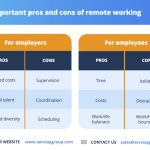Yes, you can apply for remote jobs in other countries. Many companies offer remote positions worldwide, allowing individuals to work from anywhere with an internet connection.
Working remotely for a company in another country can provide opportunities for cultural exchange and professional growth, as well as the flexibility to live and work in different locations. However, it’s essential to consider factors such as time zone differences, legal requirements, and tax implications when pursuing remote work in another country.
By understanding and addressing these considerations, individuals can successfully apply for and work in remote positions across international borders.
The Rise Of Remote Work Across Borders
Remote work is transcending borders, offering individuals the opportunity to work for companies based in different countries. This trend is fueled by various factors and comes with legal considerations that applicants need to be aware of.
Factors Fueling International Remote Opportunities
- Globalization has connected businesses worldwide, leading to the acceptance of remote workers from different locations.
- Technological advancements enable seamless communication and collaboration across continents.
- Cost-effectiveness for companies in hiring skilled professionals from countries with lower living costs.
Legal Implications And Considerations
- Work permits and visas may be required depending on the country’s regulations.
- Tax obligations vary for remote workers employed by foreign companies.
- Intellectual property rights and data security must be considered when working across borders.
Eligibility For International Remote Positions
When it comes to international remote positions, the eligibility criteria play a crucial role. Understanding the requirements for such roles is essential for individuals considering applying for remote jobs in other countries.
Qualification And Experience Requirements
For international remote positions, qualification and experience requirements vary depending on the job role and the company. While some positions may require specific degrees or certifications, others prioritize relevant experience and skills. It’s important for applicants to carefully review the job descriptions to ensure they meet the necessary qualifications.
Language And Cultural Proficiency
Proficiency in the language spoken in the country where the remote position is based is often a key requirement. Additionally, having an understanding of the cultural nuances of the country can be advantageous. This ensures effective communication and integration within the remote team.
Navigating Job Platforms For Overseas Opportunities
Exploring remote job opportunities in other countries can open up a world of possibilities for your career. When it comes to finding these opportunities, navigating job platforms specifically designed for international roles is key. Let’s delve into how you can effectively identify credible job listings and create a standout online profile to boost your chances of landing a remote job abroad.
Identifying Credible Job Listings
When seeking remote jobs in other countries, it’s crucial to identify credible job listings to ensure legitimacy and avoid scams. Look for platforms that specialize in international job postings, such as FlexJobs or Remote.co. Check for reviews and testimonials from other users to validate the platform’s reputation.
Creating A Standout Online Profile
To stand out to potential employers when applying for remote jobs abroad, creating a standout online profile is essential. Tailor your resume and cover letter to highlight your relevant skills and experiences for the specific role and location. Use keywords related to the desired job and industry to increase your visibility on job platforms.

Credit: www.reddit.com
Understanding Tax And Labor Laws
When working remotely for a company based in another country, it’s crucial to comprehend the tax implications in your home country. In many cases, you may still be required to pay taxes on your income, even if it’s earned from a foreign employer. Some countries have tax treaties in place to prevent double taxation, while others may offer foreign tax credits.
It’s essential to familiarize yourself with the labor laws of the country where your remote employer is based. Each country has its own set of regulations regarding employment, such as minimum wage requirements, working hours, and employee rights. Failure to comply with these laws could result in legal consequences and jeopardize your employment status.
— In many cases, you may still be required to pay taxes on your income, even if it’s earned from a foreign employer. Some countries have tax treaties in place to prevent double taxation, while others may offer foreign tax credits. When working remotely for a company based in another country, it’s crucial to comprehend the tax implications in your home country. It’s essential to familiarize yourself with the labor laws of the country where your remote employer is based. Each country has its own set of regulations regarding employment, such as minimum wage requirements, working hours, and employee rights. Failure to comply with these laws could result in legal consequences and jeopardize your employment status.Overcoming Time Zone Challenges
Overcoming time zone challenges is crucial when considering applying for remote jobs in other countries. Effective scheduling and communication strategies, along with the use of tools and technologies for synchronization, are essential for bridging the gap created by different time zones.
Scheduling And Communication Strategies
To overcome time zone challenges, establishing clear communication protocols and scheduling regular check-ins is vital. Using tools like Slack, Zoom, or Microsoft Teams can facilitate real-time communication, allowing team members in different time zones to stay connected and collaborate effectively.
Tools And Technologies For Synchronization
Leveraging technology is crucial for synchronizing work across different time zones. Tools such as project management software, time zone converters, and shared calendars can help streamline workflow and ensure that team members are aware of each other’s availability and working hours.
Cultural Sensitivity And Adaptation
Discover how cultural sensitivity and adaptation play a crucial role in applying for remote jobs in other countries. Embracing diverse norms and practices can enhance your chances of success in the global job market. By respecting different cultural nuances, you can navigate the complexities of working remotely across borders effectively.
Embracing Diversity In Remote Teams
Best Practices For Cross-cultural Collaboration
Cultural sensitivity and adaptation are crucial aspects when applying for remote jobs in other countries. Understanding and respecting the cultural norms of a different country is essential for successful collaboration. Remote teams benefit from embracing diversity in terms of culture, language, and perspectives. This leads to enhanced creativity and innovation in the work environment.Embracing Diversity In Remote Teams
Best Practices For Cross-cultural Collaboration
Preparing For Virtual Interviews And Assessments
Tips For A Successful Remote Interview
When preparing for a remote interview, it’s essential to create a professional and distraction-free environment. Ensure that your technology, such as your webcam and microphone, is functional and that you have a stable internet connection. Dress appropriately and test your video and audio settings before the interview. Additionally, research the company and the role, and prepare thoughtful questions to ask the interviewer.
Understanding Assessment Protocols For Remote Roles
Assessments for remote roles may include technical tests, case studies, or behavioral assessments. It’s crucial to understand the format and requirements of these assessments. Familiarize yourself with the tools or platforms that will be used, and ensure that you have the necessary software installed and updated. Practice time management and follow any instructions provided by the employer for completing the assessment.

Credit: jobicy.com
Long-term Considerations For Remote Employees
When considering remote work in other countries, long-term implications are essential for employees to ponder. Let’s delve into two critical aspects: Career Growth and Development and Managing Work-Life Balance Internationally.
Career Growth And Development
Remote employees can benefit from opportunities for career advancement through online training and skill development programs.
Networking globally can open doors to new projects and collaborations, enhancing skill sets and broadening horizons.
Managing Work-life Balance Internationally
Maintaining a healthy work-life balance while working remotely in different time zones requires effective time management and clear boundaries.
Regular communication with supervisors and colleagues is crucial to ensure alignment and avoid burnout.

Credit: m.facebook.com
Frequently Asked Questions
Can You Get A Remote Job From Another Country?
Yes, you can get a remote job from another country. Many companies are open to hiring remote workers from anywhere in the world, as long as they have the necessary skills and can work in the time zone required. It’s important to research visa requirements and tax implications before accepting a remote job in another country.
Can I Hire A Remote Worker In Another Country?
Yes, you can hire a remote worker in another country. It’s a common practice for many businesses.
What Us Companies Allow You To Work Remotely From Another Country?
Some US companies that allow remote work from another country include GitLab, Buffer, and Zapier.
Can I Work Remotely For A Us Company From India?
Yes, it is possible to work remotely for a US company from India. Many US companies offer remote work opportunities to professionals around the world. However, you may need to consider factors such as time zone differences and obtaining the necessary work permits and visas.
Conclusion
Applying for remote jobs in other countries is a feasible option for job seekers. Thanks to the advancements in technology and the growing trend of remote work, job opportunities are no longer limited by geographical boundaries. However, it’s important to understand the legal and logistical requirements before applying.
With proper research and preparation, you can successfully apply for remote jobs in other countries and enjoy the benefits of working from anywhere in the world.



